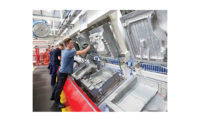On the campaign trail, President Donald Trump promised to bolster U.S. manufacturing; slash the corporate tax rate; build a wall on our southern border to keep out illegal immigrants; and invest more than $1 trillion to upgrade the nation’s aging infrastructure.
How will he pay for all that? One idea advocated by House Speaker Paul D. Ryan and Rep. Kevin Brady, chairman of the House Ways and Means Committee, is a border-adjustment tax.
Currently, companies are taxed on their profits, regardless of how much they import or export. The Ryan-Brady proposal would lower the corporate tax rate from 35 percent to 20 percent, and it would change how corporate profits are calculated. Companies could no longer deduct imports—say, goods brought in from Mexico or China—as costs. In addition, their exports would no longer count as revenues. For tax purposes, “profits” would be domestic sales minus domestic costs. Effectively, imports would be taxed at 20 percent, and exports would be subsidized.
Proponents say a border-adjustment tax would be good for the U.S. economy. Now, they argue, when foreign countries sell their products in America, they arrive tax-free. But, when U.S. companies sell their products overseas, those products are taxed here and then again in the destination country. That puts U.S. goods and services at a disadvantage.
A border-adjustment tax would also be a windfall for the federal government. Since the U.S. imports more than it exports, the proposal could generate more than $1 trillion in tax revenue over 10 years. In addition, it would reduce incentives for multinational firms to relocate their headquarters outside of the U.S. or to manipulate the tax system in other ways to shift their profits offshore. In theory, the plan would also discourage offshoring and incentivize reshoring.
What do assemblers think of the idea? It depends on whom you ask. Major exporters, such as Boeing, Caterpillar, GE and Varian Medical Systems, support the idea. The automotive industry, which purchases a lot of parts from Mexico, is less keen on it.
Wal-Mart Stores Inc. and other retailers aren’t mad about the proposal, either. They argue that the tax plan would raise prices on food, clothing, gasoline and other consumer goods.
One chink in the plan, say economists, is that the price of the dollar in global currency markets could climb in response to the tax, which would cancel out any advantages for U.S. producers. A strong dollar makes U.S. exports relatively more expensive, and imports relatively cheaper.
Will it pass? Well, Democrats are against it, because it’s a Republican proposal. (Imagine that, Democrats defending those low, low prices at
Wal-Mart.) But, even many Republicans are not sure what to think about it. The president, for his part, has said only that a “phenomenal” tax plan will be coming this spring. Stay tuned.




